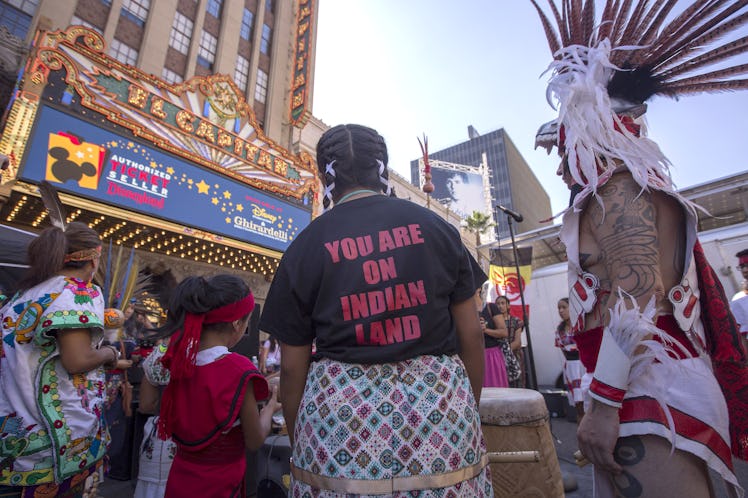
Indigenous Peoples Day Is Replacing Columbus Day In These States & People Are On Board
As most people know, Columbus Day is a widely acknowledged federal holiday that celebrates Christopher Columbus and his discovery of the Americas in 1492. While our country has been celebrating this holiday since 1937, as a reflection of American heritage, many people in recent years have criticized Columbus' voyage as an invasion of the land that Native Americans claimed long before the Italian settler took it from them. In light of the changing attitudes toward this holiday, Indigenous Peoples Day is replacing Columbus Day in these states, and people are on board.
Now, before we get into that, let's establish how Columbus Day came to be a federal holiday in the first place. The first people to praise Christopher Columbus were Italian-Americans in New York City in 1792, marking the 300th anniversary of their ancestor's arrival in what they claimed to be their land. Since then, many Italian-Americans hold parades and festivals to celebrate the second Monday of October. The holiday wasn't made official until the state of Colorado declared it an official holiday in 1905. In 1937, former President Franklin D. Roosevelt announced Columbus Day to be an official country-wide holiday.
Despite this, Christopher Columbus' history has always been riddled with controversy.
While Columbus did have a great impact on the future of Atlantic trade, he also is to blame for the enslavement of Native Americans and spreading deadly diseases cross-continentally. The indigenous societies of the Americas "were decimated by exposure to Old World diseases, crumbling under the weight of epidemic," historian David M. Perry wrote.
"Columbus didn't know that his voyage would spread diseases across the continents, of course, but disease wasn't the only problem. ... He also took slaves for display back home and to work in his conquered lands."
While people have celebrated this history for years regardless of the ugly truth, many cities are refusing to do so anymore.
The first city to recognize Indigenous Peoples Day was Berkeley, California in 1992. This year, Seattle, Minneapolis, Austin, Salt Lake City, Santa Barbara, Silver City, Los Angeles, and New Mexico have all opted out of Columbus Day and adopted the new name. Not all states are adopting the "Indigenous Peoples Day" as a replacement. Hawaii, for example, has replaced Columbus Day with “Discoverers’ Day,” and South Dakota has deemed the new holiday, “Native Americans Day.” Additionally, many other cities have expressed interest in making the switch in future years.
In President Trump's speech commemorating Columbus Day, he honored the "skilled navigator and man of faith, whose courageous feat brought together continents and has inspired countless others to pursue their dreams and convictions–even in the face of extreme doubt and tremendous adversity." He went on to say,
The permanent arrival of Europeans to the Americas was a transformative event that undeniably and fundamentally changed the course of human history and set the stage for the development of our great Nation.
Comparatively, former President Barack Obama also acknowledged Columbus Day last year, but recognized the ugly, and often less acknowledged sides of Columbus' voyage. Obama said Columbus' "legacy is embodied in the spirit of our Nation." But he went on to say,
As we mark this rich history, we must also acknowledge the pain and suffering reflected in the stories of Native Americans who had long resided on this land prior to the arrival of European newcomers," which included "violence, deprivation, and disease.
President Trump is not wrong in saying that the European voyage changed the course of human history and development for America. While that is an undeniable fact, it is crucial to simply acknowledge the truth about white imperialism and the foundations upon which our "great nation" was built. Who knows what would have been if Columbus had not "discovered" the Americas, but the least we can do, as Americans, is recognize that it wasn't ours to begin with.